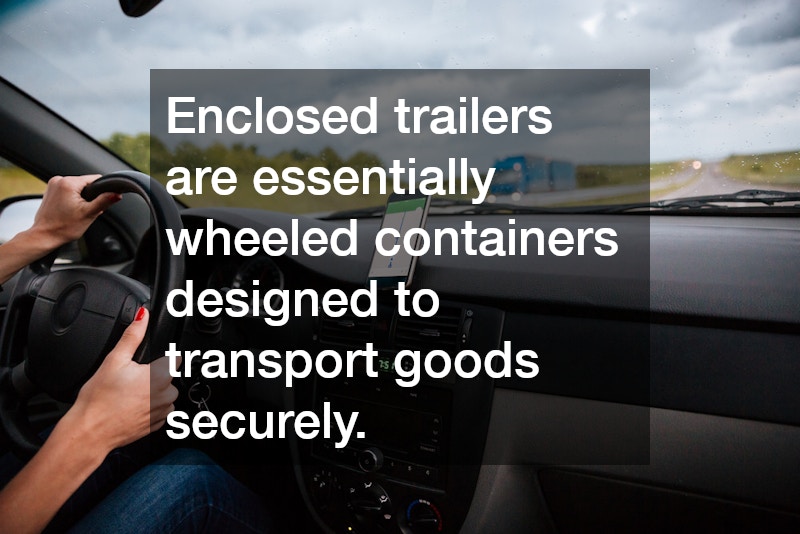
Purchasing an enclosed trailer can be a daunting task, especially if you are not familiar with the specifics of what to look for. Enclosed trailers offer a wide range of options for different needs, whether you’re hauling equipment, furniture, or precious cargo. This guide aims to help you understand the essential factors to consider when investing in an enclosed trailer.
Understanding the Basics of Enclosed Trailers
Enclosed trailers are essentially wheeled containers designed to transport goods securely. Unlike open trailers, enclosed trailers provide protection from the elements as well as additional security. When selecting an enclosed trailer, it’s crucial to understand the different sizes and configurations available, as they directly relate to the trailer’s capacity and versatility.
The size of the trailer is one of the first things to consider. Enclosed trailers come in various lengths and widths, catering to different hauling needs. It’s important to determine the purpose of your trailer to select the appropriate size, whether for personal possessions, business purposes, or recreational activities.
Additionally, consider the construction material of the trailer. Most enclosed trailers are made from steel or aluminum, with aluminum being the lighter option, which may enhance fuel efficiency. However, steel is typically stronger and more durable, which can be beneficial for consistent heavy-duty use.
Identifying Your Needs
Before purchasing an enclosed trailer, clearly define what you intend to use it for. This will help guide your decision-making process and narrow down your options. Think about the type of cargo you will be transporting, as this will affect the size, features, and weight capacity you require.
If you’re planning to transport vehicles, for instance, you’ll need a trailer with sufficient load capacity and door configurations to accommodate easy loading and unloading. For transporting delicate items, ensure that the trailer is equipped with features like padding or tie-down points for securing the goods. Knowing your needs helps prevent overbuying or ending up with a trailer that doesn’t meet your requirements.
Consider also where you will be storing the trailer when it’s not in use. Enclosed trailers can be bulky, and adequate storage space will be needed to keep them secure and well-maintained. If space is limited, folding or compact models might be more suitable options.
Exploring Features and Accessories
The available features and accessories can greatly enhance the functionality of your enclosed trailer. Some trailers come with built-in shelving, racks, or cabinets, optimizing storage and keeping items organized during transport. Additionally, options like interior lighting can be invaluable when loading or unloading in dim conditions.
Another important feature to consider is the trailer’s ventilation system. Proper ventilation is essential to prevent moisture buildup and protect your cargo from damage. Some enclosed trailers offer side vents or roof vents that help maintain air circulation.
Moreover, consider security features that protect your belongings. Many modern trailers come with advanced locking systems that offer greater peace of mind. Accessories such as GPS tracking or alarms can further enhance security, ensuring the trailer and its contents are protected against theft.
Budget Considerations and Financing Options
The cost of an enclosed trailer can vary significantly based on size, materials, features, and brand. Setting a realistic budget is essential to avoid overspending. Research the average price ranges for the type of trailer you need and the features you desire.
Exploring financing options can make purchasing an enclosed trailer more affordable. Many dealers offer financing plans with competitive interest rates and flexible terms. Make sure to compare these options and choose one that best fits your financial situation without compromising your needs.
It may also be beneficial to consider used trailers, which can be more cost-effective and still in good condition. If you are considering a used trailer, ensure that you conduct a thorough inspection to avoid unforeseen repair costs. Look for signs of structural damage or wear and tear that could affect the trailer’s performance and safety.
Making the Final Decision
Once you have identified your needs, explored options, and established a budget, it’s time to make your final decision. Take the time to compare different models and brands, paying attention to the specifications and customer reviews. A reputable dealer will be willing to answer any questions and provide all the necessary information, ensuring you are confident in your purchase.
Consider scheduling a test drive or in-person inspection if possible. This allows you to assess the trailer’s condition and functionality firsthand. Checking how the trailer handles on the road and its ease of use can reveal how suitable it is for your requirements.
Remember that purchasing an enclosed trailer is a substantial investment. Ensure that you’re fully informed and comfortable with your choice, and prioritize quality and durability to maximize value over time. By being thorough in your selection process, you can purchase an enclosed trailer that serves your needs effectively and reliably.



